Published texts by individuals reflect their opinions only and not those of editorial or publishing platforms.
Author: Manuela Woywode
Place: Deutschland
Format: Text
Topic: Politics, Society, Extremism, Minorities, Economy
Date: 05.06.2022
Portal: www.peacemaker-tour.com
Text length: approx. 5 min.
Language: German/English
Title: Disruption and Rebuilding in the Middle East
Disruption and Rebuilding in the Middle East
How can there be so much hatred when human beings are basically yearning for love? And why does violence exist? Or do we as humans not crave tenderness? And why does war exist when human beings actually strive for peace, protection and security from the moment of birth? These are the extreme polarities in the world, the existence of dark sides that seem so incomprehensible to me. Questions that have preoccupied me for a long time and conditions that, in different forms, occur almost everywhere that people live together. The Middle East has been a hotspot among them for a long time.
I must confess that in 2015, while the refugee crisis and the conflict in the Middle East became more present in Germany, I was deeply moved by the topic, but at the same time it was also too abstract and complex for me to be able to understand in the slightest what was happening over there and what is happening here now. Moreover, the media presented merely a part of this complexity. Yet it was easy, with a click, just to turn off the TV and the news to escape the confusion and chaos. Not until late 2016 and early 2017 it became increasingly difficult for me to keep the Middle East, the conflicts there, the war and the wave of refugees, at an emotional arm’s legth from me. I met the new boy next door at that time. He fled from his home town in Damascus to Germany, the family next door took him in for a while, gave him the opportunity to go to grammar school, to socialize and thus gave him a warm and secure welcome to his new life. We became friends and I got to know more about him, his culture and his life in Syria and finally here in Germany. I quickly realized that the Middle East is much more than just a war zone. In addition, this dark side of the world, with its wars, hatred and violence, seemed even more incomprehensible to me, and I wondered more and more about the importance of peace. A while later, I met an author who was presenting her novel about the long journey that a refugee boy made to Germany, and we started talking about her very personal experiences about the life and integration of refugees in a small town near Würzburg, and I absorbed all the stories and insights; I couldn’t and still cannot comprehend the conflicts in the Middle East.
The subject became more present again during my time as a student at the Faculty of Design in Würzburg. In the context of a small third-semester project, I was looking for someone or something I felt like tipping my hat to – “Chapeau” was the name of the class I was taking at the time. By chance, while strolling in a bookstore, I came across the book “Peacemaker - My War. My Peace. Our Future.” by Simon Jacob. I read the synopsis, flipped through the book briefly and immediately thought to myself, kudos. Finally, about a week later, the author Simon Jacob himself came to Würzburg for a reading and shared his intention of trying to take a step closer towards peace instead of war, so I became more interested and felt the urge to spread his message and create a project about him and his Peacemaker Tour. This resulted in fine illustrations accompanying excerpts from his book, with a little background information on the countries Simon Jacob travelled to in the Middle East and illustrated models showing the beauty of the countries and the individuality of the people there.
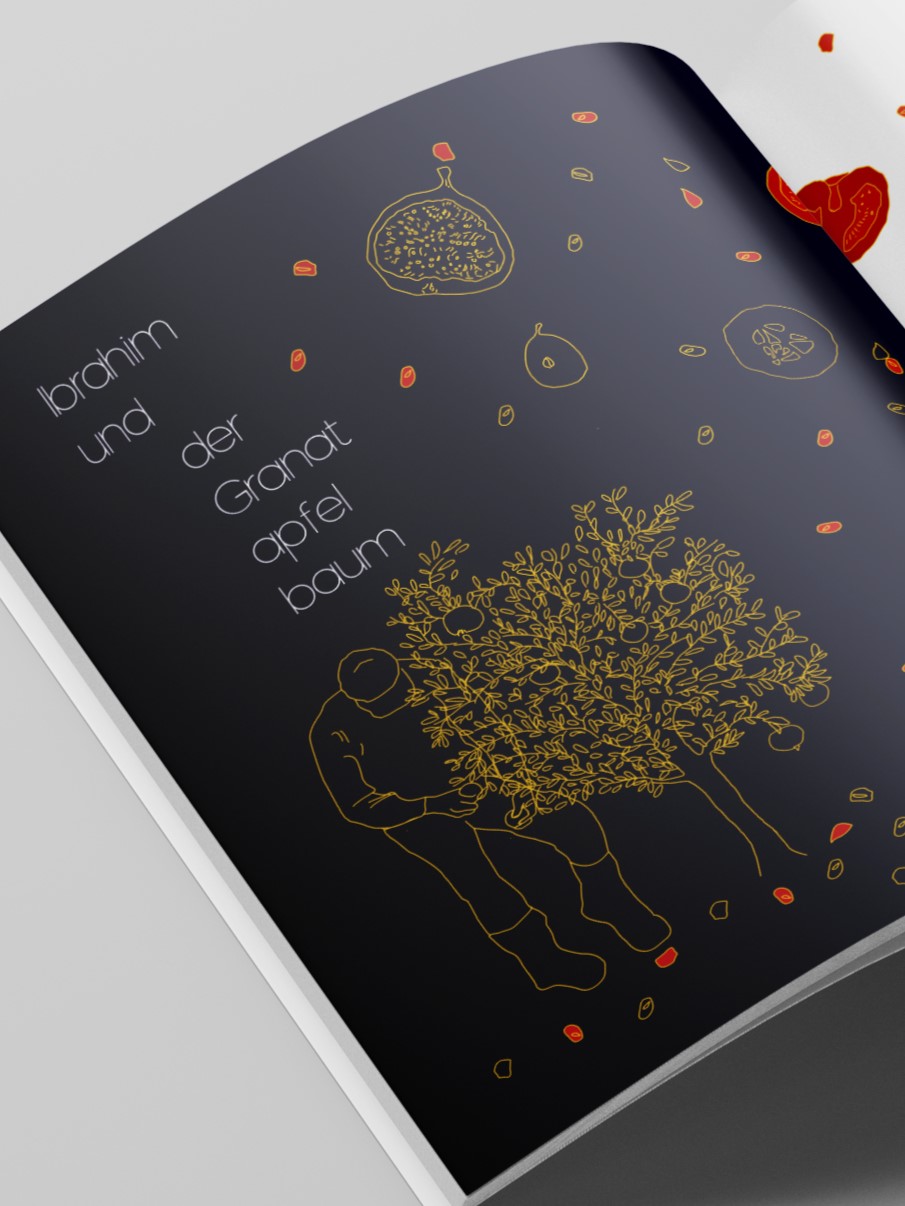
Almost two years later, I was about to write my bachelor’s thesis. Both in terms of content and visuals, I addressed the enormous amount of discontinuities in the world and the question of rebuilding. In doing so, the question of the definition and meaning of a disruption came up again and again. When, where and how do certain things fall apart? Can a decline, a destruction or a turning point be described as a disruption at all? By referring to history, philosophy, psychology, sociology, politics and natural sciences, I aimed to look at the topic from several different perspectives in order to also emphasize the diversity of the processes of disruption and rebuilding that occur on an everyday basis. During my research, I discovered that almost everywhere that movement takes place, as well as standstill, where flowing but also abrupt changes take place, there is an ongoing process of disruption and rebuilding. From the simple analysis of materials to the quest for and discovery of disruption and rebuilding processes in nature, in society, in the individual itself, as well as in art, architecture and literature, an enormous range of themes has already emerged in just five months, in which these very processes can be found.
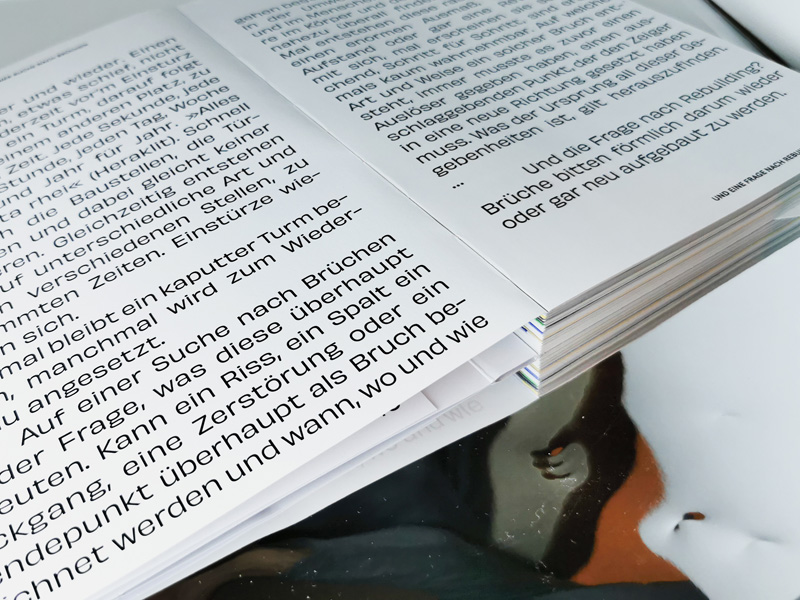
The fact that the Middle East has played an important role among those is obvious. Looking at society and the individuals in it first reveals everyone’s limited view of the world. Depending on the environment, own experiences, learned norms and values, each individual creates his or her own reality. In the process, it seems that what we think and what we feel, as well as what we believe and what we think we know, has great impacts on our bodies and, at the same time, influences our actions. And these individual behaviors in turn have an enormous influence on the environment, society, politics and the world around us. One could say that people’s inner disruptions are reflections of their outer disruptions, and vice versa. Accordingly, it cannot be denied that human influence is not always positive for the world. A look at the World Peace Index indicates the steady deterioration of the peace process for nine consecutive years. So unfortunately there is no shortage of crises, conflicts and wars. Worldwide, there are a total of 359 conflicts, among which there are 21 wars and 19 limited wars, and about 180 violent, 70 non-violent crises, as well as 69 disputes to be resolved (cf. Statista 2020). North Africa and the Middle East are still the major areas of conflict. The latter is usually only seen as a field of disruptions. However, the fact that the Middle East is much more than just a war zone and that alongside its old and new disruptions, rebuilding processes are simultaneously taking place, is almost ignored in the Western world. For now, the fifth chapter of my bachelor thesis focuses precisely on that. Between war and peace. Someplace in between. This is where I talk about Simon Jacob. With his photographs, provided to me for this project, as well as fine illustrations that emphasize the fragility of the people and the land there, I show excerpts from his book as well as from his articles, which can be found on his website. Unfortunately, as an outsider with too little knowledge, I lack a direct connection to the events in the Middle East. Since I nevertheless wanted to give the reader a perspective on the processes of disruption and rebuilding in the Middle East that is as accurate as possible, Simon Jacob helped me. During a personal interview, he shares his perspective on the concept of disruption and links it to the Middle East, society and Europe. And he explains his definition of rebuilding, showing how it is already happening: “Healing begins wherever fault line conflicts have arisen.” This interview with Simon Jacob shows a larger picture of the Middle East and always brings plausible explanations and arguments where oftentimes, questions arise.
The Middle East appears to be so far away and complex, and yet the topic is both very close and present here in Germany, which makes me believe it is gaining more and more relevance, even as an “outsider”, to come to understand this fascinating and complex region of the Middle East. In the end, we all live together on this one planet, characterized by a polarity between hate and love, darkness and light. And healing and peace can only be achieved together.
The Middle East is constantly exposed to old and new processes of disruption and rebuilding. What is the significance of disruptions in the Middle East, and how is it possible to rebuild if such processes have not already been initiated...
AN INTERVIEW WITH SIMON JACOB
What is your definition of disruption?
If you refer to conflicts that are accompanied by a “disruption”, we speak of a “fault line conflict”. The striking difference is that such a “disruption” takes place across ethnic, cultural as well as sectarian borders. That is the major misunderstanding that Western nation-states hold whenever we speak of “fault line conflicts”. Fundamentally can be said, as a narrative for all fault line conflicts, that feudal tribal structures, or more precisely the conflict between tribes that differ in religious and cultural composition, results in conflicts and later in cross-border wars. This can be observed in Syria, Iraq, North Africa and other regions of the world. Respectively, a “disruption” never establishes national-territorial borders. The territorial ground is formed by the territorial claims of feudal structures. In the West, we refer to them as clan structures. In the microcosm of urban regions, this is already happening here in Germany. A look at Berlin and the existing conflicts between Arab and Chechen clans, for example, is proof of this.
In which areas do you notice disruptions in the Middle East, in society, in people themselves?
And as mentioned above, disputes are often rooted in ethnic, cultural and religious borders. These conflicts usually involve resources, such as pasture land, claimed by nomads, resulting in a conflict with local farmers. Or about water, a very expensive resource that has become essential for survival in some arid regions of the world. In most cases, limited resources along with a disproportionately increasing population lead to fundamental conflicts. Then, given the limited resources and unfair distribution of these resources, corruption arises. Corruption results in discrimination towards less well represented ethnic groups, which can still be considered as the majority. Syria, which has a dominant Alawite minority and Sunni majority, serves as a good example. Based on these conflicts, those involved look for reasons to "annihilate" the opponent. From that point on, religion takes on a major role as it superficially provides reasons to argue for the "otherness of the opponent". Religion degenerates into a weapon and is instrumentalised as such. This effect is unfortunately reinforced at an exponential rate by the increasing spread and dominance of social media in the world. Talking about "Hatespeech", "Fakenews"...etc. The Westernised person may be annoyed by this merely in the act of discourse. In the Middle East, it leads to increased conflicts and deaths in real terms. A trend that journalists like me, who observe the situation in the field, have pointed out for years. With social media taking hold in authoritarian regions, the rules of the game have also changed massively. This is something that Western politicians have failed to understand until today. Only the impacts on the West, the influence on young people across Europe by extremist organisations like the IS, gradually resulted in a rethink. I hope, for the sake of democracy, that a critical approach, combined with a greater understanding of the situation of our direct neighbours - both the Middle East and North Africa - will be pursued more seriously. So far, I have not felt that there is enough will to tackle the issue with the necessary intensity, especially in the enlightening dialogue with the citizens.
Are there any gaps in the comparison between the Middle East and Europe?
Yes, you only have to look at the different subcultures of those who once came to us from feudal, patriarchal structures and who have increasingly found mew homes in Europe since 2015. The gap between democracy, or the understanding of democracy, and the tribal principle, combined with an authoritarian collectivism that barely grants the individual any rights, especially the female members of society, occurs here. This automatically results in conflicts. The freedom of women, serving as an example, coupled with their right to express themselves sexually and to be in control of their own mind and body, is contrary to the code and the tribal principles of collective societies. This is where Europe, Germany, made mistakes decades ago. Just because someone crosses the borders of the EU does not mean that they leave the clan code behind and will suddenly act democratically. This is an illusion that those young people who want to break away from collectivism, such as in urban subcultures in Berlin, are aware of, but they cannot because it exposes them to a real threat. Honour killings, for example, are the result of such conflicts, which, by the way, also existed in Germany in a similar form until fairly recently. It was only with improved rights and the preservation thereof for the female part of society that the situation changed for the better. Basically, this was part of the sexual revolution. This is a development that is still taking place in the Middle East and other tribal societies.
What does rebuilding mean to you?
Rebuilding, especially with the support of the West, will always have to be tied to the UN Charter and universal human rights. There is no way we can solve all problems in a short time and with money only. But we ought to set primary conditions. Education for women, for example, the fight against corruption, local efforts to educate young people, respect for religious freedom, mediation by intermediaries. Europe, as a neutral authority with a UN mandate, needs to provide security on a local and temporary basis. Germany in particular struggles with this, in the light of its own tragic history. But there is no way to avoid sending German soldiers to conflict regions in order to ensure the security of such regions and, ultimately, our own security in Europe. If we manage to create education and jobs through secure rebuilding programs, young people will no longer have any reason to flee, join the IS or take up arms. However, this requires the will of European politicians to explain this to the citizens - detached from elections and personal interests. Peace and the preservation of democracy in Europe depends on our ability to understand the situation in the Middle East and North Africa.
In what areas do you see a reconstruction or a turning point? And where is healing needed?
Healing starts wherever fault line conflicts have arisen. Both sides have suffered in some way, in the past or in the present, so you need mediators, activists, and projects that are prepared to mediate in a completely neutral way - Project Peacemaker, for example, is such an endeavor. I was personally very surprised to learn that the initiative has hardly received any support from politics and the established media. As a result of the "pacification" of the region and the resulting reduction of "fault line conflicts", there is an urgent need for joint reconstruction projects in cooperation with as many groups as possible. Joint project construction is the only way to enable a peaceful coexistence of different ethnic groups that previously lived almost completely isolated from each other, only a few kilometers apart.
Are there rebuilding processes already?
Yes, the Ministry of Development, church charities and private aid organizations are building schools, establishing training centers, assisting in the reconstruction of the infrastructure and thus creating many jobs. This is happening particularly intensively in regions where people have been able to leave the war behind, such as in Iraq. The bitter aspect here is the fact that this is an oil-rich country and Iraq would actually have enough potential to provide its entire population with everything they need. However, corruption and the unequal distribution of wealth hinder a good life for all ethnic groups. Therefore, I personally believe that all rebuilding processes must also be tied to the requirement to fight corruption. Iraq, given that it has the resources, must also contribute financially to various projects. This is not possible in every region, such as those less blessed by oil resources in Africa. But countries like Iraq definitely have the resources. How else can one explain to German taxpayers when they see on social media that the number of registered luxury cars in some Iraqi metropolises appears to be larger than in Munich or Frankfurt?
Requests should be addressed to: Project Peacemaker e.V., Ms. Daniela Hofmann, Rechte Brandstr. 34, 86167 Augsburg, Phone. + 49 89 24 88 300 50,
This email address is being protected from spambots. You need JavaScript enabled to view it.
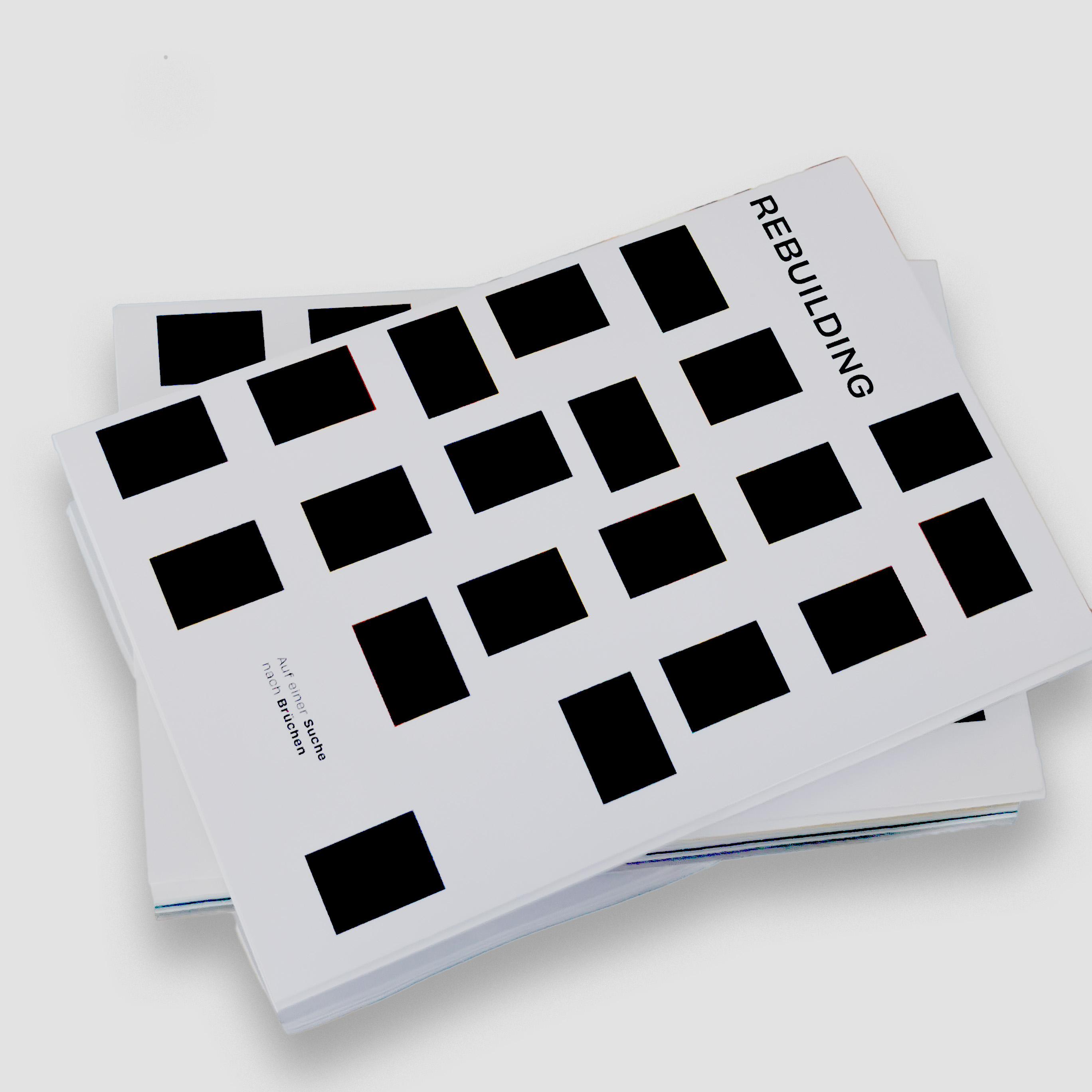


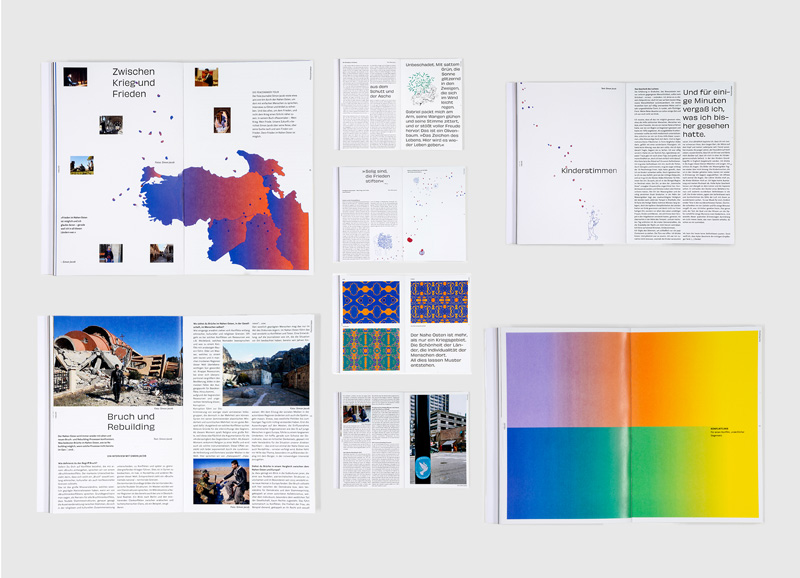


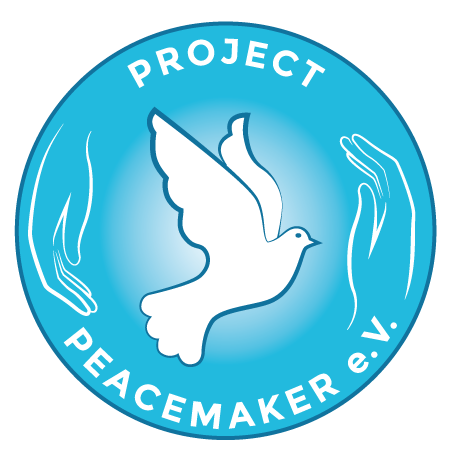
 Donate
Donate  Download centre
Download centre

